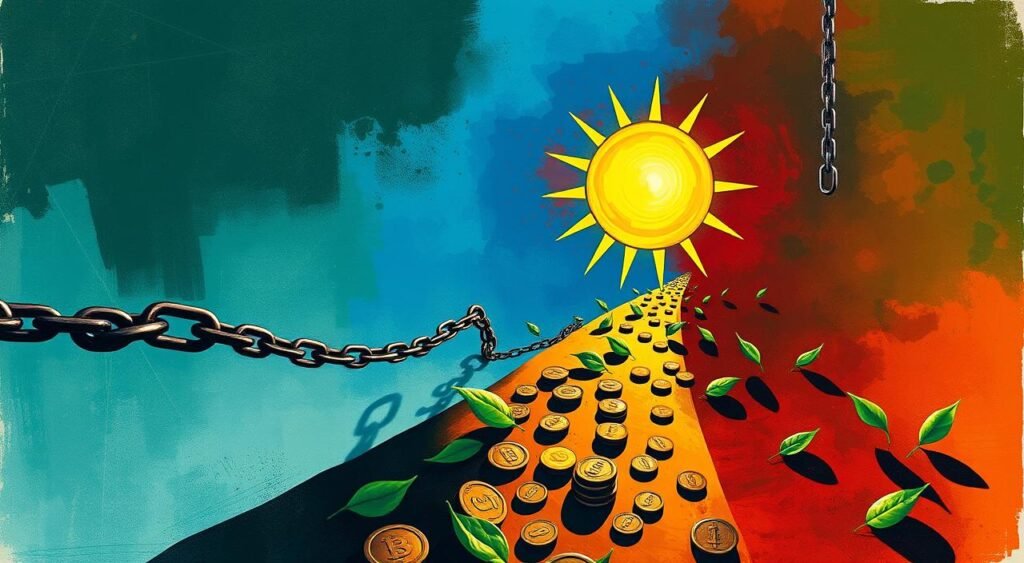How Can Loan Settlement Help You Pay Off Debt Faster?
If you’re drowning in debt, loan settlement might be the lifeline you need. It’s a way to talk to creditors about paying off a big chunk of your debt at once. This can cut down what you owe, making it easier to be debt-free sooner.
Debt settlement offers vary, but usually, you can get 10% to 50% off your debt. On average, people settle for about 48% of what they owe. Sometimes, creditors will even accept up to 80% off. You can work with a debt settlement company or talk directly to your creditors to find a deal that works for both sides.
Loan settlement can be a good way to get out of debt, but it’s not without risks. It can really hurt your credit score, dropping it by 100 points or more. This can put your score in the poor range. Also, the settlement will stay on your credit report for up to seven years from when you first fell behind on payments.
Key Takeaways
- Debt settlement can help reduce the total amount owed, potentially accelerating debt repayment.
- Negotiated settlements typically range from 10% to 50% of the original debt, with an average of 48%.
- Debt settlement companies charge fees of 15% to 25% of the enrolled debt, collected after successful settlement.
- The debt settlement process can take 3-4 years and may not always be successful, as not all creditors accept settlement offers.
- Debt settlement can significantly impact your credit score, resulting in a drop of 100 points or more.
Understanding What Loan Settlement Is and How It Works
Loan settlement is when borrowers talk to creditors to lower the amount they owe. This can include credit cards, medical bills, and personal loans. They stop making payments and save money in a special account. This saved money is then used to pay off the debt for less than what’s owed.
The Process of Negotiating with Creditors
Talking to creditors about loan settlement can be tricky. Borrowers might work with debt settlement companies or try to negotiate themselves. The aim is to get a deal where the creditor accepts a smaller payment, usually between 10% to 50% of the original debt.
Types of Debt Eligible for Settlement
- Credit card debt
- Medical bills
- Personal loans
But, not all debts can be settled. Secured debts like mortgages or auto loans can’t be settled this way. Only unsecured debts can be negotiated through loan settlement.
Timeline and Success Rates
The time it takes to settle debt can be 24 to 48 months. Success rates vary. Some creditors, like Chase, won’t deal with debt settlement firms. They only talk directly to consumers or non-profit credit counseling agencies. The success of a settlement depends on the creditor’s willingness, the borrower’s financial situation, and the negotiator’s skills.
“Loan settlement can provide debt relief, but it’s important to understand the process and potential risks involved.”
Benefits and Risks of Loan Settlement Programs

Loan settlement can help reduce debt, but it has big risks. It might let you pay off debts faster, in two to four years. Yet, it can hurt your credit score and future money health.
One good thing about debt settlement is avoiding bankruptcy. It can also stop collection calls and suit for credit card debt. This gives a chance to settle debts without going to court.
| Potential Benefits | Potential Risks |
|---|---|
|
|
But, debt settlement has downsides too. It can really hurt your credit scores, dropping them to the mid-500s. Settled debts can stay on your report for up to seven years. Fees from debt settlement companies can be high, from $500 to $3,000 or more.
Also, the forgiven debt is taxed by the IRS. This can lead to more taxes for you. Creditors might not agree to negotiate, making things uncertain. Stopping payments can add more debt with late fees and interest.
In summary, debt settlement can offer some relief from debt. But, it’s crucial to think about the benefits and risks carefully. Getting advice from a financial expert can help you make a choice that’s right for your future.
How to Choose the Right Loan Settlement Strategy

When dealing with debt, you have several options. This includes working with debt settlement companies or trying DIY debt negotiation. It’s important to pick the best strategy for your financial situation and goals.
Working with Debt Settlement Companies
Good debt settlement companies are clear about their costs, terms, and how long it will take. They shouldn’t ask for money upfront or promise results. These companies can help negotiate with creditors, which might lower your debt. But, make sure to check their success rate and understand how it might affect your credit score and taxes.
DIY Settlement Negotiations
If you’re ready to put in the work, DIY debt settlement negotiations could save you money. By talking directly to creditors, you might get a deal that fits your budget. This method needs patience, good negotiation skills, and a clear understanding of the settlement evaluation process.
Evaluating Settlement Offers
Look at the debt reduction percentage, how it might affect your credit score, and any tax issues. Compare this with other debt relief options like credit counseling or debt management plans. This helps you choose the best option for your financial future.
Choosing a loan settlement strategy depends on your financial situation and the options available. It’s also wise to get advice from a financial advisor or the Federal Trade Commission. They can help you understand the pros and cons of debt settlement companies and make a smart choice for your money.
Financial Impact of Debt Settlement on Your Future

Debt settlement can change your financial future for good. It might give you quick relief from debt. But, it can also hurt your credit score for years, making it harder to borrow money and get good interest rates. Still, with smart planning, you can fix your credit over time.
Dealing with debt can teach you to manage money better. It’s key to plan your finances well after settling debts. Look for advice from experts to help you rebuild your credit, save for emergencies, and set financial goals.
Experts say your payment history is a big part of your credit score, making up 35%. Missing a payment can lower your score by 100 points or more, especially if you have a high score. Also, your credit utilization ratio, which is 30% of your score, can be affected by debt settlement.
Debt settlement might also mean taxes. If you get debt forgiven worth over $600, the IRS might see it as income. It’s vital to know the tax side and get help to lessen the financial hit.
Even though debt settlement can clear debts faster than bankruptcy or debt management plans, think about the long-term effects. Creating a detailed financial plan and fixing your credit over time is key to long-term financial stability and a debt-free life.
“Debt settlement can be a useful tool for those struggling with overwhelming debt, but it’s important to understand the potential long-term impact on your financial future. Careful planning and professional guidance can help mitigate the risks and put you on a path towards financial stability.”
Also Read: Payday Loan Requirements: What You Need To Qualify Fast!
Conclusion
Loan settlement can help you pay off debt faster. But, it’s important to think it over carefully. Whether you work with a debt settlement company or do it yourself, knowing what you’re getting into is crucial.
Loan settlement can give you financial freedom by lowering your debt. But, remember the risks and long-term effects. These include how it might hurt your credit score and if you’ll have to pay taxes on it. It’s key to handle your debt responsibly to achieve lasting financial stability.
Loan settlement is just one way to deal with debt. You should think about it carefully, knowing both the good and bad sides. By staying informed and getting help when needed, you can confidently move forward. This is a big step towards taking control of your financial future.
FAQs
Q: What is loan settlement and how does it provide debt relief?
A: Loan settlement is a process where you negotiate with your lender or a debt relief company to reduce the amount of outstanding debt you owe, allowing you to pay off your debt faster. This can include settling credit card debt, personal loans, or even student loans for less than the total amount owed, providing significant debt relief.
Q: How can I negotiate a settlement with my debt collector?
A: To negotiate a settlement with a debt collector, start by assessing your financial situation and determining how much you can afford to pay. Then, contact the debt collector and propose a settlement amount that is lower than your total outstanding debt. Be prepared to explain your financial hardship and why they should consider your offer.
Q: What are the alternatives to debt settlement?
A: Alternatives to debt settlement include debt consolidation, where you combine multiple loans into one with a lower interest rate, or credit counseling, which involves working with a credit counselor to create a repayment plan. These options may help manage your debt without the negative impacts of a settlement.
Q: Will loan settlement affect my credit score?
A: Yes, loan settlement can negatively impact your credit score. When you settle your debt for less than the full amount, it may be reported as a settled account, which can lower your credit score. However, the long-term benefits of reducing your debt may outweigh the short-term credit score impact.
Q: What types of loans can be settled?
A: Various types of loans can be settled, including credit card debt, personal loans, and student loans. However, it’s important to note that not all lenders will agree to negotiate settlements. Private student loans and unsecured debts are often more flexible in this regard than secured loans like mortgage loans.
Q: How do debt relief services work?
A: Debt relief services work by negotiating with your creditors on your behalf to reach a settlement agreement. These services often charge a fee for their assistance, and they typically require you to stop making payments to your creditors while they negotiate. This process can lead to a lower settlement amount, but it may also affect your credit score.
Q: What should I look for in debt settlement companies?
A: When choosing a debt settlement company, look for ones that have a good reputation, positive reviews, and are accredited by organizations such as the Better Business Bureau. Ensure they provide transparent information about their fees, the settlement process, and how they will communicate with your creditors.
Q: Can I settle my education loan?
A: Settling education loans, particularly federal student loans, is more complicated than settling other types of debt. While it’s possible to negotiate settlements for private student loans, federal loans typically offer repayment plans and forgiveness options that may be more beneficial. It’s advisable to consult a credit counselor for guidance.
Q: What is a personal loan settlement?
A: A personal loan settlement is when you negotiate with your lender to pay a reduced amount on your personal loan. This can help you pay off the loan faster and avoid further debt collection actions. The terms of the settlement will outline the settlement amount and any potential impacts on your credit report.
Source Links
- https://www.investopedia.com/personal-finance/debt-settlement-cheapest-way-get-out-debt/
- https://www.cnbc.com/select/what-is-debt-settlement/
- https://www.investopedia.com/personal-finance/what-lawsuit-settlement-loan/
- https://lendingplate.com/blog/loan-settlement
- https://www.incharge.org/debt-relief/debt-settlement/debt-settlement-pros-cons/
- https://www.experian.com/blogs/ask-experian/debt-settlement-risks/
- https://www.bankrate.com/personal-finance/debt/is-debt-settlement-good-idea/
- https://debthelper.com/debt-settlement-program/
- https://www.investopedia.com/articles/pf/09/debt-settlement.asp
- https://www.incharge.org/debt-relief/debt-settlement/effect-on-credit-report/
- https://upsolve.org/learn/debt-settlement-pros-and-cons/
- https://settleloan.in/blog/settleloan/pros-and-cons-of-loan-settlement-what-you-need-to-know/
- https://www.cashe.co.in/our-blog/what-is-loan-settlement/
- https://settleloan.in/blog/settleloan/debt-management-tips-after-personal-loan-settlement-impact-benefits-and-conclusion/
